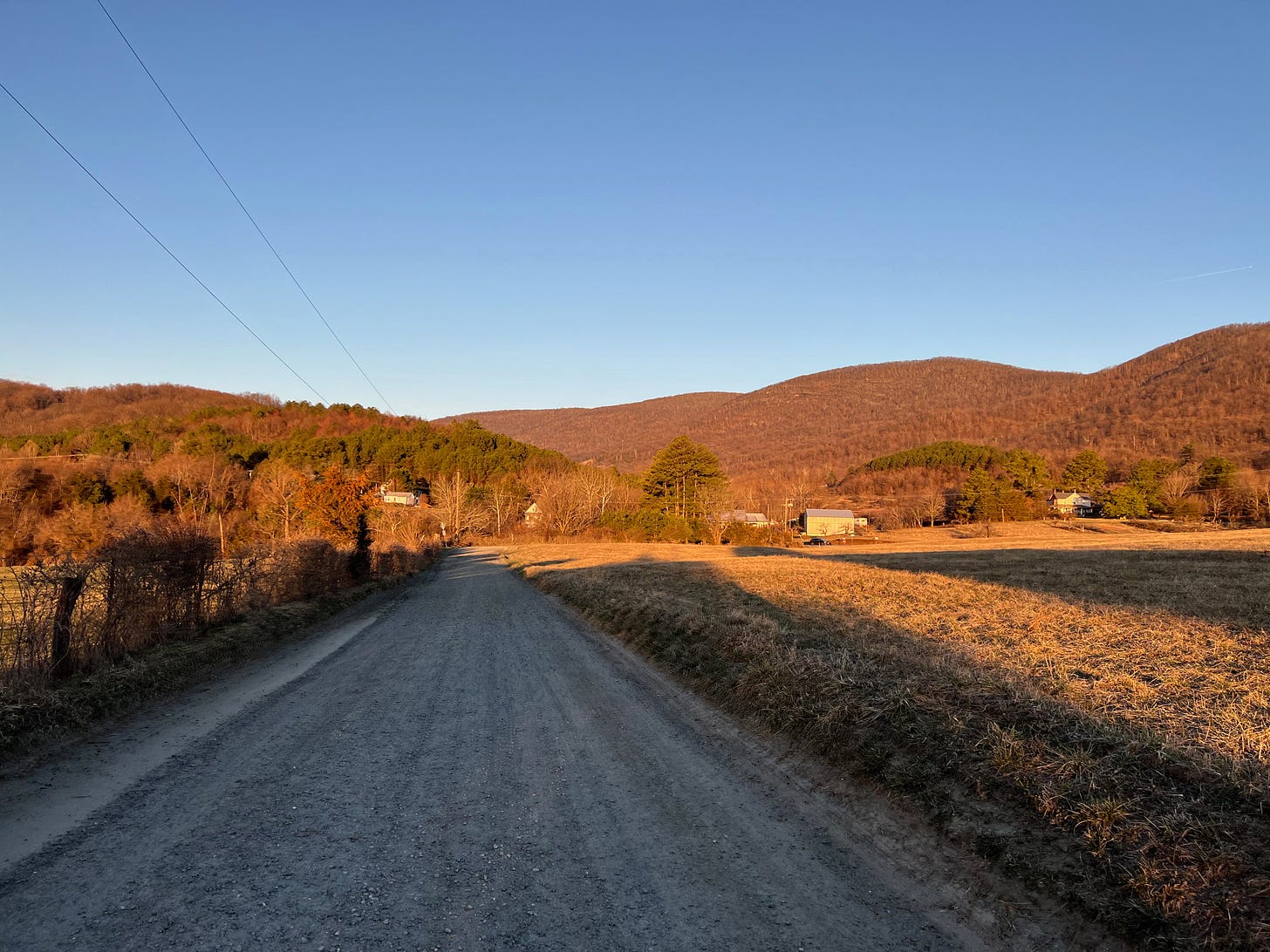A short one this month: generational wealth, less moving, faster real estate, a quick homeowners tip, and a story about more than windows.
But first, the market
It’s exhausting for buyers, buyer agents, sellers, and seller agents.
tl;dr:
If you’re thinking about buying or selling in the Charlottesville area, I think there is a real sense of urgency to do that sooner rather than later. (I’m a Realtor; ask me about this.)
My thoughts on the increasing rates, in part:
… interest rates are hovering around 5%, and this is the first time in memory that they have sustained around that number. And I think I met with five or six buyers over the weekend and to a person they were talking about reducing their budgets by $20,000 and $50,000 from when they started the search process many weeks and months ago, respectively.
A text from another agent two weeks ago - before rates went to 5%. “I have now lost six buyers who either cannot find anything to buy (and will rent - god knows where) or who were planning a move here (two CA, 1 NOVA, etc.) but became fed up”
“If we hold income constant at its Feb 2021 level, the 95 basis point increase in rates from Feb. 2021-Feb.2022 resulted in a ~$53,000 decline in house-buying power. Some buyers are being priced out of a housing market experiencing double-digit house price growth & rising rates.”
Generational Wealth
My wife and I were talking about how Realtors can affect generational transfer of wealth.
Realtors have a complex role - we guide, advise, educate, prepare, counsel buyers and sellers, and yet, we make no actual buying or selling decisions in the home buying/home selling process.
We are conduits of information and analysis, and yet we have historically played a remarkable (and remarkably bad role) in human settlement and segregation patterns and helping people make good decisions. Still, we have a lot of work to do.
Consider that right now the net wealth of a typical Black family in America is around one-tenth that of a white family. A 2018 analysis of U.S. incomes and wealth written by economists Moritz Kuhn, Moritz Schularick, and Ulrike I. Steins and published by the Federal Reserve Bank of Minneapolis concluded, “The historical data also reveal that no progress has been made in reducing income and wealth inequalities between (B)lack and white households over the past 70 years.”
From the NAR’s At Home With Diversity course
What happens when Americans stay in the same house forever?
“Americans used to move a lot; now they don’t. It could be causing a social crisis.”
A client sent me this story; they’ve been in their house for a decade. Two threads of response:
1 - economically
We have an inventory crisis. Even with rates rising, I don’t know that I see the inventory crisis subsiding much:
People who bought at < 3.5% interest rates may never sell.
New construction is expensive. In Albemarle and Charlottesville, 88 homes have closed so far this year; average price is $698K, median is $651K.
Buyers still want to live in the Charlottesville area, but they are now driving to qualify to afford homes. (I wrote in 2008 that we needed more density and higher gas prices.)
The more people seem to stay in one place, the more they fight to keep others (the NIMBY philosophy) out. Often, those “others” are our kids, parents, or friends.
2 - societally
While the majority of Americans are happy where they are — according to Gallup survey data in 2016, 74 percent of Americans rated their current residence as ideal — this growing bloc of “trapped” or “stuck” communities has concerning cultural effects.
Buttrick and Oishi’s big takeaway: When people move less, it affects culture. Less dynamism, increased aversion to risk, suspicion of outsiders, cynicism, unhappiness, and “people who feel less free to live their social lives as they see fit.”
Looking at a survey of 16,000 Americans, the authors find that people who want to move but remain at the same address the following year are more likely to disagree that “hard work can help a person get ahead,” even when controlling for a bunch of factors like socioeconomic status, health, age, race, and more.
“Wanting to move but being unable to leave leads people to wonder about whether their other efforts in life will be rewarded,” the researchers write.
It’s going to be very interesting in the coming years to see how a stationary society + work from home lead to cultural and societal shifts. Anthropologically, I suspect there will be some fascinating stories to be told.
Push Button Real Estate
Does real estate really need to be so fast?
I was showing a house recently to clients whom I’d represented about a decade ago. She remarked, “It still amazes me how little time we have in a house before we’re supposed to decide if we want to spend the next part of our lives here!”
It’s true. I’d say on average, between showing and home inspection, most of my buyer clients spend less than 5 hours in a house before they move in. That’s sort of frightening.
I’m kind of looking forward to the next real estate market where we have more time to be thoughtful about the process. Yes, there are efficiencies to be gained in the market - titling (Blockchain anyone?) and the lending process (Why does refinancing take so long? I’ve paid on time for 10 years; just adjust my loan!), but I want the home inspection process to allow for deliberations.
For most people, housing is not a commodity; it’s a home and a place to live.
Homeowners Insurance Tip
Check your replacement cost with your homeowners insurer. With the appreciating market and unprecedented increase in construction, material, labor, and more costs, what you’re covered for might not actually cover rebuilding your home.
Story of the windows
A long time ago, I was at a final walkthrough for a new construction home. I vaguely remember the clients, I seem to recall the house location, but I vividly remember this:
As the builder was walking around showing my clients some of the nuances of the home, he approached a window and started to demonstrate how to pop out the sash (a newer feature at the time; –as I said, this was a long time ago).
The husband, wife, and I were standing to the left of the builder. He popped the sash, made eye contact with the wife, and said, “And this is how you clean the windows.”
I don’t remember what happened after that, but I have since been hyper conscious to communicate to each of my clients, to make eye contact with each, to cc everyone (this is huge!), and to treat everyone as equals. Same reason I ask “Who cooks?” rather than assume one or the other does the bulk of the cooking.
Lessons learned and applied:
Assume nothing
Think before you speak
Don’t be a jackass
What I’m Reading
As locals are priced out, Colorado mountain towns fight to keep workers
Reasons why people don’t want to return to offices. (there are a lot, and the ramifications on local economies and society are as of yet unknown)
Related story: The next life of downtown
This is brilliant - a site that searches for identical furniture and finds the cheapest offering.
4 Reasons Higher Mortgage Rates Are Actually Good for Homebuyers










